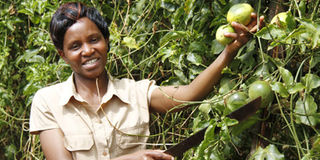With my juice bar, brokers can’t earn a penny from me

Philomena Nduku at their sweet yellow passion farm in South Gatundu in August 2, 2014. PHOTO / JEFF ANGOTE.
What you need to know:
- To make the seeds, he starts by letting the fruits to overripe.
- With pruning, irrigation and supply of manure after every three months, Mundia says that the sweet yellow passion can be harvested for up to six years.
- Only seven out of the 13 seedlings grew as expected. Even with this low survival rate, Mundia was pleasantly surprised to reap Sh150,000 seven months later.
It is a market day on this Friday in Gatundu and Charles Mundia is gearing up to sell his produce. He packs the sweet yellow passion fruits in bags.
Some of the fruits are destined to his hotel next to the Gatundu bus stop, while the rest are for traders at the open air market.
Mundia is a sweet yellow passion fruit farmer who reaps big rewards by selling the fruits, seeds, seedlings and juice.
“Sweet yellow passion fruit juice has high demand. Many people love it because of its unique test.”
He makes the juice from ripe fruits using an extractor.
“The process starts with cleaning the fruits after harvesting and putting them in a blender minus the outer shell. I do not add any preservatives,” says Mundia, who sells a glass of juice in his hotel at Sh50. An astute farmer, Mundia also prepares seeds that he sells to different customers.
To make the seeds, he starts by letting the fruits to overripe.
Once they are ready, he squeezes the juice, then washes the seeds. The fruits used for making the juice are different from the ones he extracts seeds from.
“While washing, I separate the seeds which sink in water in a basin from those that float. During grading of seeds, the ones which sink are the best for germination.”
After selection, the seeds are dried under direct sunlight for five hours. He then packs them in small bags which he sells according to the number of seeds.
“A bag containing 1,000 seeds go for Sh2,000,” says Mundia who retired in 2006 and sells the seeds mainly to farmers. He makes at least Sh10,000 a month from the seeds.
SEEDLINGS
He advises that seedlings should be bought when they are about three inches high for easy planting. If not, they will require the farmer to first prune the vine before planting them.
With pruning, irrigation and supply of manure after every three months, Mundia says that the sweet yellow passion can be harvested for up to six years.
To plant passion fruit seedlings, a farmer should first prepare compost mixture, preferably from cow dung for at least three months before mixing it with the top soil.
Holes are then dug nine feet apart to allow for erection of poles and galvanised wires for the climbing vines to wind on.
Two buckets of water are poured to each hole which is covered with dry grass for mulching.
But farming was not always on Mundia’s mind. He occasionally planted maize and beans and had two or four banana trees in his compound.
“I was not keen on farming. In fact, I planted maize and beans to avoid leaving the land bare when everybody else was farming.”
But when he retired from the Ministry of Water, he went into farming by joining a banana farmers’ group.
He grew the crops for three years before turning to sweet yellow passion fruits.
The shift was occasioned by a Kenya Agricultural Research Institute (Kari) training session he attended in 2011. The training equipped him with the skills of planting and caring for sweet yellow passion fruit plants.
The enthusiastic 62-year-old travelled to Jomo Kenyatta University of Agriculture and Technology in Juja to buy his first seedlings.
Mundia invested in 13 seedlings which he bought at Sh60 each.
Only seven out of the 13 seedlings grew as expected. Even with this low survival rate, Mundia was pleasantly surprised to reap Sh150,000 seven months later.
COMMERCIAL FARMING
It was then that he went into commercial farming, buying another 100 seedlings from Kari plus two grams of seeds to prepare his own seedlings.
After preparing two-acres of land which took 10 days, he planted the seedlings. Seven months later, he had his first harvest. His target market were hotels and the nearby markets which bought a kilo of the fruits at Sh70. One vine, he says, yields around 40kg of the fruits per season.
Gakunyi Njoroge, an assistant director in the Ministry of Agriculture, says that manure from animals should completely decompose before being used to plant the fruits.
He notes that decomposition of manure helps in prevention of diseases that would otherwise be transferred to the plants through absorption.
He, however, warns that farmers should be careful when processing their own seeds because they may expose them to Passion Fruit Woodiness Virus, a disease which is transmitted through seeds. He adds that many farmers do not have the capacity to prevent the disease.
“If you want to process your own seeds, ensure that they are disease-free.” Passion fruits grow best at an altitude of 1,200 to 2,000 metres above sea level, and at a soil PH of 5.5 to 7.
One acre accommodates about 670 plants.





